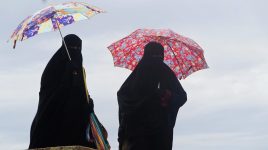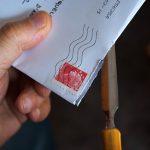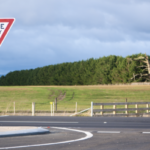When do police have the power to demand the removal of face coverings?

In Wales, a member of the ‘Jedi church’ said that he felt crushed and humiliated after being refused entry into a Tesco supermarket. Daniel Jones would not comply with requests to remove his hoodie, which he insisted was a central part of his religion.
The 23 year old was approached by staff and told to remove his hoodie or leave the store. He refused and gave them his church business card.
Following the incident, Tesco stated that Jones has not been banned from the store and that the store continues to welcome members of the Jedi church into their store, however they are asked to remove their hoods.
They noted that Obi-Wan Kenobi, Yoda and Luke Skywalker all appeared hoodless without going over to the dark side, and warned that if the Jedi walk around Tesco with their hoods on, they would miss a lot of special offers.
While this story notes the humorous side of rules requiring the removal of face coverings, it also highlights a very real and sensitive issue.
According to section 19A of the Law Enforcement (Responsibilities and Procedure) Act, police may require a person to remove a face covering so that they or another police officer can see their face in two situations:
- The person is lawfully required by the officer to remove the covering to provide photographic identification
- The person is lawfully required by the officer requesting the removal to identify themselves or provide other identification particulars
The request to remove a face covering does not constitute a search.
This means that police can require any driver to remove their face covering so that police can check that the driver licence bears the photo of the driver.
The power also extends to other forms of photo identification, such as a passport, identity card or any other kind of licence which has a photo of its holder.
A police officer who requires someone to remove a face covering:
- Ask for the persons co-operation
- Give the person reasonable privacy if this is requested
- Keep the process as quick as reasonably practicable
These powers have been part of the NSW law since 2011.
The basis is so that police can identify people who may have committed an offence, as well as the identity of drivers.
This allows police to know if the driver has committed prior offences as well as making sure the right person is charged or given a ticket.
The new laws followed the case of a Muslim woman who filed a false complaint against a police officer.
She was charged by police and the court gave her a six month prison sentence.
However, the case was thrown-out on appeal because her face-covering meant that the prosecution could not prove beyond reasonable doubt that it was her who made the complaint, rather than someone else.
The Islamic Council of NSW and the Lebanese Muslim Association support the laws regarding removal of face-coverings, but add that they must be imposed sensitively.
The Queensland parliament rejected similar legislation earlier this year.
Are religious grounds a reason not to comply?
No, they are not.
When police are exercising these powers, particularly when the head covering is worn for cultural or religious reasons, they are required to observe the principles of multiculturalism.
However, this does not excuse people from removing face coverings.
The legislation does state that a person does not have to remove a face covering if they have a legitimate medical reason or another special justification.
When a person cannot comply with the requirement to remove face coverings, the onus is on them to prove their special justification prevents them from doing so.
What happens if I don’t comply?
The penalties for failing to comply depend on the situation. If a person refuses to comply when police ask for a driver or passenger’s identification, the maximum penalty is $5,500 and/or 12 months in jail.
This is much harsher than penalty applying any other situation, which is a maximum fine of $220 and no jail.
In addition to facing criminal charges, people may be denied access to government services or facilities which require entrants to remove a face covering.
This includes accessing any government office, place, space or facilities where it is necessary to ascertain a person’s identity, having documents witnessed by a Justice of the Peace or provide proof of age.
The laws don’t just focus on the people wearing face coverings – any lawyers or JPs who refuse to comply can also face fines of up to $220.
Courts also have the power to require entrants to remove face coverings and helmets in court premises if they obscure the face of the wearer.
Security officers can ask any person entering a court building to remove the covering to see the persons face, as well as if the officer has grounds to arrest that person.






